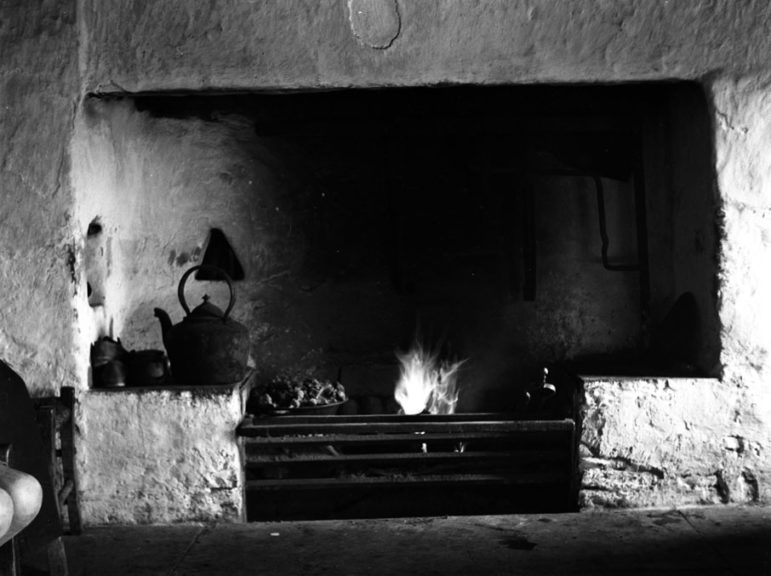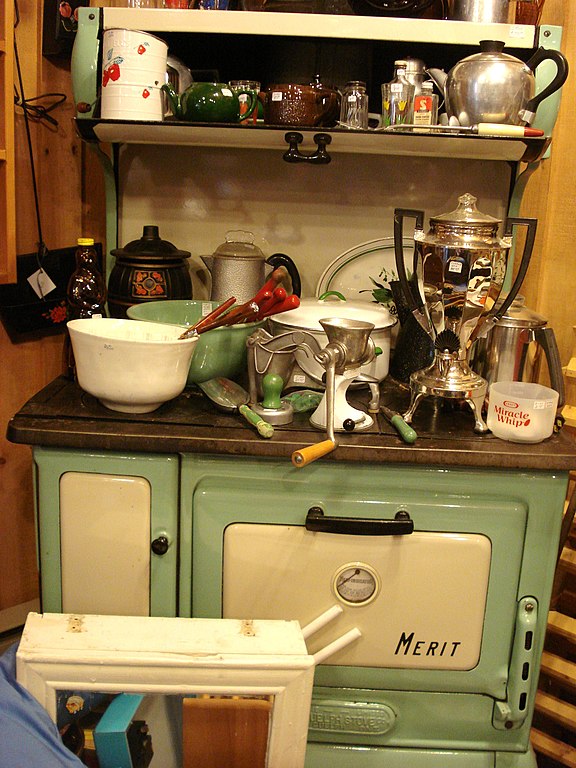
Every Monday in my new home I have set aside time to make an offering in the little space next to my stove. The space itself has been there since I’ve had a house where it would be safe. It’s a plain vase, a statue, sometimes a candle, a small and unremarkable gathering compared to many of my other altars. There is very little to mark it as an altar at all, except that it is always there, unchanging as I move between apartments.
This is the first time I have done anything like tending it. It’s still a surprise. When I was unpacking, unwrapping all the fragile things that make up the physical aspects of my spiritual life, I thought that I might leave these pieces boxed, at least for a while. In my last space they had gathered dust and grease, unremarked upon as the kitchen bustled around them. They were a marker of the place I considered closest to the hearth of my apartment, a nod in the direction of the space itself as possessing some slight power.
It wasn’t as though I had a real hearth, I thought. A hearth is the heart of a home, the place where people might gather for heat and company as much as food. In most homes I had visited I found the hearth either in the basement, somewhere between the hot water heater and the furnace, or near the fireplace. Putting anything next to the stove was an attempt to create that sort of space for myself. The problem was that I didn’t believe it.
Other people I know have strong relationships with the spirits that live in, or perhaps enliven, the spaces they live. They carve small gnome-like figures, leave out bowls of oatmeal on the holidays, grow plants dedicated to the life and health of the home itself. They form bonds with places the way they do with friends, acquaintances that grow with time and tending into vibrant, joyful parts of their lives.
I, on the other hand, have always thought of myself as someone who is passing through.

Old Irish Hearth Lough Doolin C. Clare, 1935 [public domain]
When my parents sold their home it came as a shock. Not because it was a bad idea – a combination of time and hardship had made an already old house difficult to tend – but because it felt, suddenly, as though there were no ground beneath my feet. It had always been home. I remembered moving there in the same way as I remembered visiting the farm my father had grown up on – hazily, the way I remember important things from my very young life. The last time I had visited, I had dug up a jar full of dirt from the garden, paying for that with a skinned knuckle that felt more than fair. If all else failed, I thought, if the plans I made for myself crumpled up, at least there would be a patch of ground somewhere in Kansas that knew me and was waiting.
Finding out that ground belonged to someone else threw me into a spin. I sat in the little apartment that I didn’t yet know would take me through lockdown and put my fingers against the jar of dirt I’d carried back to my home states away. I had left home more than a decade before, and the last chance I’d had to visit was years in the past. There was no reason to feel as though I didn’t have a home anymore. Still, I found myself looking at options and, for the first time, wondering about owning my own place.
“You realize,” my partner said, “plenty of people never own land.”
“I know that,” I said, thinking of planting apple trees with my father when I was still young enough to play with the imaginary friends who lived in their branches. “I just thought that once you did it was for keeps.”
“Nothing about the world is for keeps,” she pointed out. “Land gets taken away all the time. Why would that matter, for where your home is?”
I didn’t have an answer, exactly. What I had was an image in my head of a tree I’d visited on my college campus. It gripped the earth next to the little stream that ran through the quad, its roots exposed by the water as a knotwork of wood that held it aloft as the ground beneath it wore away. In my senior year it toppled and cut off the stream, its branches still green and vibrant while its roots grasped at air.
;

A propane fireplace [Cantons-de-l’Est, Wikimedia Commons, CC 4.0]
When I’m told to picture somewhere safe and comfortable, the image that most often occurs to me is a hotel room. It’s true that they’re impersonal, and staying in one for more than a few days starts to wear on the part of me that takes joy in decorating my surroundings. But I’ve always thought there’s something honest in a space designed to hold people for a night or two before letting them move on. There’s nothing expected. As long as I don’t put a hole in the wall I’ll be able to move on without any problems, unremarkable as any other traveler. I appreciate a straightforward transaction.
Apartments feel different. They hold whole pieces of my life, memories vibrant with the light from certain windows or the sound a particular radiator used to make. I vacuum their floors and fight their pests, even paint their walls – and then I leave them. I’ve never felt comfortable calling one home in any sort of permanent way. Home is somewhere that feels solid- somewhere I can put my things and tend my space, somewhere that I have a level of control. For many years, home has been somewhere that I’m not.
Instead, I have built my comfort out of items that can be moved as I travel. My house is built of furniture and statues, things that I can tend if they break or start to wear. I’ve never had a fireplace- but three small items that can go next to any stove, that find a place on any small shelf? Those I can rely on.

An old stove at an antique store in Nova Scotia [in pastel, Wikimedia Commons, CC 2.0]
The only thing different about my current apartment is that it is only mine.
“Hello house,” I said to it, standing in the main room on the day I got my keys. “My name’s Luke. I’m going to be here for a while.” I watched the light coming into the empty space, and listened as well as I could. “I’ll try to take good care of you, while I’m here.”
Maybe starting a relationship is as simple as that. Maybe the lack of anybody else made it easier to hear the spirit of the space I’m in, now. Or maybe it’s simply that investing in a space is holistic. I am the only person who cleans, buys food, figures out the smaller foibles of the hardware when the door jams or the drain clogs. It is impossible, with all of my things around me, to keep from thinking of the space as mine.
Or, rather, as ours. On Monday evenings I cook – something without salt, something sweet and filled with grain – to put it on my hearth. “Hello house,” I say, and leave it. I am not sure who I am building a relationship with, or what I am doing, but it feels a little like burying my hands in the dirt.
The Wild Hunt is not responsible for links to external content.
To join a conversation on this post:
Visit our The Wild Hunt subreddit! Point your favorite browser to https://www.reddit.com/r/The_Wild_Hunt_News/, then click “JOIN”. Make sure to click the bell, too, to be notified of new articles posted to our subreddit.